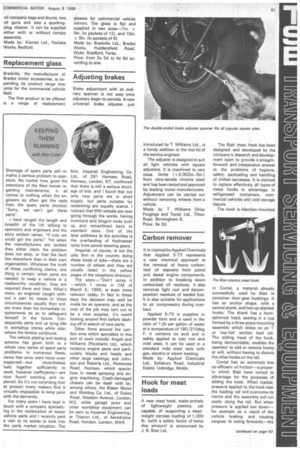/KEEPING \ THEM RUNNING , \ With Ron Cater
Page 63

If you've noticed an error in this article please click here to report it so we can fix it.
Shortage of spare parts still remains a serious problem to operators. No matter how good the intentions of the fleet owner regarding maintenance, it all comes to nothing when the engineers so often get the reply from the spare parts stockist: "Sorry, we can't get these parts".
I have ranged the length and breadth of the UK talking to operators and engineers and the story seldom varies: "If only we could get the parts!". Yet when the manufacturers are tackled they either claim the problem does not exist, or that the fault lies elsewhere than in their own organization. Whatever the truth of these conflicting claims, one thing is certain: when parts are needed to keep a vehicle in a roadworthy condition, they are required there and then. What's more, an engineer caught without a part he needs in these circumstances usually then orders more than his immediate requirements so as to safeguard himself in the future. Consequently parts end up lying idle in workshop stores while elsewhere the famine continues.
The vehicle plating and testing scheme has given birth to a whole new series of spare parts problems. In numerous fleets, items that once were never even inspected—but nevertheless held together sufficiently to work, however inefficiently—are now found wanting and replaced. So it's not surprising that at present many makers find it virtually impossible to keep pace with the demands.
For many years I have kept in touch with a company specializing in the reclamation of motor vehicle parts and I recently paid a visit to its works to look into the parts market situation. The firm, Imperial Engineering Co. Ltd., of 261 Hornsey Road, Hornsey, London, N7, confirmed that there is still a serious shortage of bits, and I found that not only new parts are in short supply, but parts suitable for reclaiming are equally scarce. I noticed that fifth-wheels are now going through the works, having trunnions and kingpin locks built up and remachined back to standard sizes. One of the later additions to the activities is the overhauling of Hydrosteer rams from power steering gears.
Imperial, of course, is not the only firm in the country doing these kinds of jobs—there are a number of others and they are usually listed in the yellow pages of the telephone directory.
The story—"Don't scrap it which I wrote in CM of March 5, 1965, is even more relevant today. In fact in these days the decision may well be made for an operator, and as the cost of the job may turn out to be a nice surprise, it's worth looking around first before dashing off in search of new parts.
Other firms around the London area which specialize in this sort of work include: Angell and Williams (Peckham) Ltd., which reclaims engine parts and particularly blocks and heads and other large castings: and Johnson and Roberts Ltd., Pembroke Road, Hornsey, which specializes in metal spraying and engine machining. Crash-damaged chassis can be dealt with by, among others, the Blaker Motor and Welding Co. Ltd., of Dukes Road, Western Avenue, London, W3, while garage jacks and other workshop equipment can be sent to Imperial Engineering, or Trianon Ltd., of Aerodrome Road, Hendon, London, NW4.




































































































